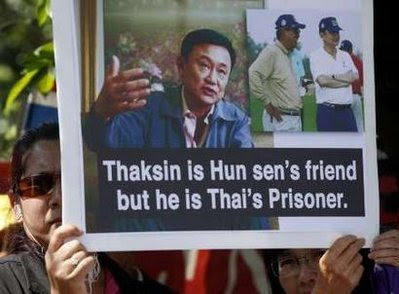Police in Kampong Thom province have blocked villagers from participating in a Buddhist ceremony at a remote pagoda on disputed land for the past two days, officials said Thursday.
Celebrants of the Kathen ceremony, in which the faithful bring offerings to sequestered monks, were stopped 15 kilometers outside the pagoda, in Santhouk district, which the provincial governor called “illegitimate.”
“We blocked them, but it does not mean we’re preventing people from holding the ceremony,” the governor, Chhun Choan, said. “That place is part of a land concession given to a company for the investment of rubber.”
Villagers from the provinces of Kandal and Kampong Cham had meant to travel to the Meakea Prachea Hema Voan pagoda, with gifts for monks who must remain on the premises for three months. The Katen ceremony ends Nov. 2.
“Yesterday, they blocked one convoy, and today another,” said Leng Chea, a monk’s assistant. “If they claim that the pagoda is illegal, they must wait until the ceremony is finished.”
The pagoda, located 100 kilometers from Kampong Thom town, was built by an association assisting debilitated soldiers. It is little more than a small house where two monks live.
Khun Sok Kea, head of the association, said he had acquired the land legally in 2004.
 (All Photos: SRP Pennsylvania)
(All Photos: SRP Pennsylvania)


 A demonstrator holds a banner with pictures of exiled former Thai Prime Minister Thaksin Shinawatra with Cambodian Prime Minister Hun Sen during a rally outside the Cambodian Embassy in Bangkok on October 27. (Photo: Reuters)
A demonstrator holds a banner with pictures of exiled former Thai Prime Minister Thaksin Shinawatra with Cambodian Prime Minister Hun Sen during a rally outside the Cambodian Embassy in Bangkok on October 27. (Photo: Reuters) A demonstrator holds a banner with pictures of exiled former Thai Prime Minister Thaksin Shinawatra with Cambodian Prime Minister Hun Sen during a rally outside the Cambodian Embassy in Bangkok on October 27. (Photo: Reuters)
A demonstrator holds a banner with pictures of exiled former Thai Prime Minister Thaksin Shinawatra with Cambodian Prime Minister Hun Sen during a rally outside the Cambodian Embassy in Bangkok on October 27. (Photo: Reuters) Parliamentarian Mu Sochua appeared in court on Wednesday as the judges rejected her appeal of a defamation conviction. (Photo by: Sovan Philong)
Parliamentarian Mu Sochua appeared in court on Wednesday as the judges rejected her appeal of a defamation conviction. (Photo by: Sovan Philong)